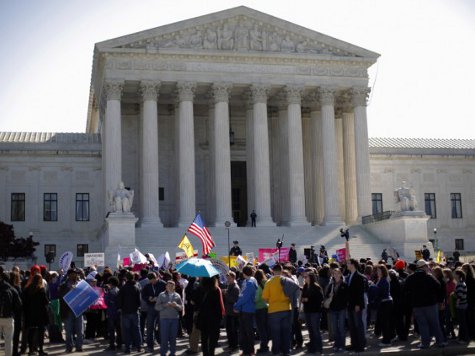According to Chief Justice John Roberts and his liberal colleagues on the Supreme Court, Congress does not have to call a tax a tax in order for it to be a tax. Congress can, in fact, create a penalty instead of a tax, and the President can tell the nation it is not a tax, but the courts can later decide Congress meant otherwise.
Never mind that Congress made it clear it did not intend to impose the individual mandate to buy health insurance as a tax. Never mind that the razor-thin majority by which Obamacare passed would never have existed if that majority had known it was imposing a tax on every living American. Never mind that the case might not have made it to judgment until 2014 if it had walked into the courthouse as an objection to a tax.
The decision in NFIB v. Sebelius is the worst since Kelo v. City of New London (2004), in which the Supreme Court held that a government may seize private property under its eminent domain powers–for the benefit of another private property owner. The two decisions are, in fact, related, since Obamacare forces individuals to pay a private insurance company for insurance, ostensibly for the greater public good.
True, the Supreme Court affirmed that the Commerce Clause limits federal power–an important precedent. And the Court struck down Obamacare’s requirement that states carry the burden of an expanded Medicaid program, meaning that the so-called “Affordable Care Act” will neither be affordable nor workable. (Is that what President Obama meant when he said he needed a second term to “redo” the act? Was he tipped off?)
It is also true that the Court’s image as an impartial, non-partisan body has been upheld–but that was never a real test. It was a false premise imposed by the president, the Democrats, and the mainstream media, who insisted that any decision that didn’t go their way would be evidence that the Court was comprised of right-wing political hacks. (Was Roberts affected by their relentless, unprecedented, inexcusable bullying?)
Politically, today’s decision is a huge win for the Obama administration–and perhaps, too, for the Obama campaign. Even though the conservative base could be energized by outrage over the decision, the Democrats’ strategic advisers believe that voters like winners, first and foremost–and they may be right. Obama’s first term is no longer a “waste,” as Mitt Romney suggested recently, and opponents of Obamacare will struggle to argue that the law is illegitimate, rather than merely bad policy. Romney will have to take up the substance of health care reform rather than just its constitutionality–a more complex argument to make.
More broadly, Americans’ confidence in the judiciary will be damaged by this decision–as much as by Bush v. Gore. Liberals have long believed the Court is merely a political institution. For conservatives, it will be difficult not to see the Court as a political institution whose rules and culture are hostile. It is now customary for Republican appointees to become more left-wing over time; the reverse almost never happens. The answer cannot be to win more elections. A bigger shift, in the legal academy perhaps, will be necessary to restore what conservatives consider the Framers’ constitutional vision. And that could take generations.
The Supreme Court has made a wrong decision, for the wrong reasons, in defense of a wrong policy. If citizens do not rush to the polls to undo what has happened–and after today, I am not certain that they will–our health care system will be ruined, our Treasury bankrupted, and our Republic endangered.

COMMENTS
Please let us know if you're having issues with commenting.